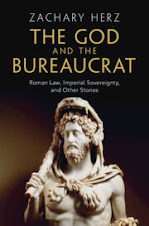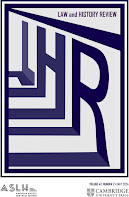[Congratulations to Professor Donahue. We wish we could be there! DRE]
The Learned and Lived Law: A Celebration in Honor of Charles Donahue, May 19, 2025, Lewis 214, Harvard Law School.
Please join us for a celebration honoring Professor Charles Donahue and marking the publication of
The Learned and Lived Law: Essays in Honor of Charles Donahue. We will have a day of presentations by chapter authors as well as a display of medieval manuscripts in the Harvard Law Library in the early afternoon.
Welcome
8:45 – 9:00 am
Interim Dean John C.P. Goldberg
Saskia Lettmaier and Elizabeth Papp Kamali
Panel 1: Roman Law
Chair: James Townshend
9:00 – 10:00 am
Charles Bartlett, Roman Property, Corporate Personhood, and the Politics of Natural Law in Medieval and Early Renaissance Italy: Venice, Baldus, and the res communes omnium
Wim Decock, “For the Sake of Mental Health and Mutual Peace”: The Transactio-Agreement in Early Modern Law and Theology
Panel 2: Medieval and Early Modern Law
Chair: Elizabeth Papp Kamali
10:15 – 12:15 pm
Samantha Kahn Herrick, Getting Ahead in a Twelfth-Century City: The Ambitious Monks of Saint-Clément, Metz
Ryan Rowberry, The Papal Constitution Execrabilis (1317) and Clerical Justices in the English Royal Courts
Elizabeth Mellyn, Suicide in Early Modern Italy
Carol Symes, The “Desire of Deeds”: On Cherishing Medieval English Charters
12:15 – 1:15 pm
Lunch available in Lewis 202
Medieval Manuscript Display
Harvard Law Library, 4th floor, Caspersen Room
1:15 – 2:15 pm
Arranged by Sarah Wharton, Historical & Special Collections
Co-Hosts: Carol Symes and Charles Bartlett
Panel 3: American Legal History
Chair: Ryan Rowberry
2:30 – 3:30 pm
Sally Hadden, Lawyers and Their Book Collections: Notes from the Eighteenth Century
Amalia Kessler, The American Importation of the Comparative Accusatorial/Inquisitorial Divide: Francis Lieber’s Failed Transplant and Its Early Twentieth-Century Resurgence
Panel 4: Literature and Legal Theory
Chair: Saskia Lettmaier
3:45-4:45 pm
Anton Chaevitch, Faust: Goethe’s Guide to Legal Progress
Bharath Palle, Wesley Hohfeld’s Modernist Imagination
Closing Reflection
Mary Elizabeth Basile Chopas,
De Magistro eruditissimo et beneficentissimo












